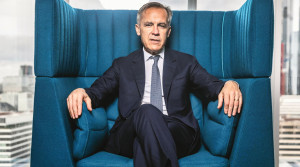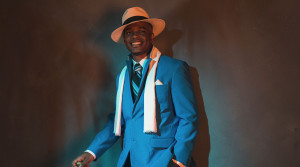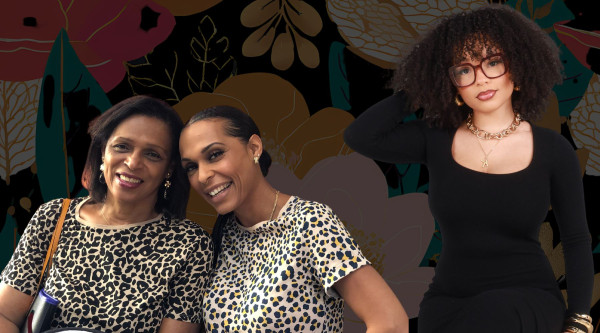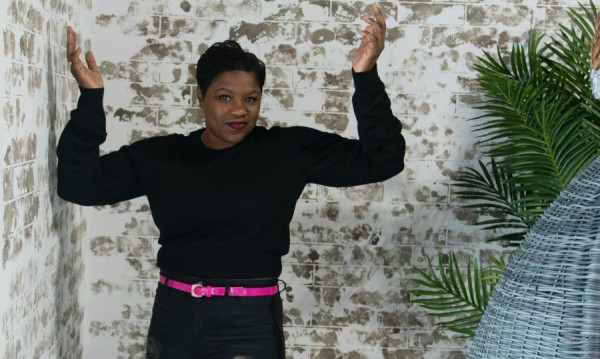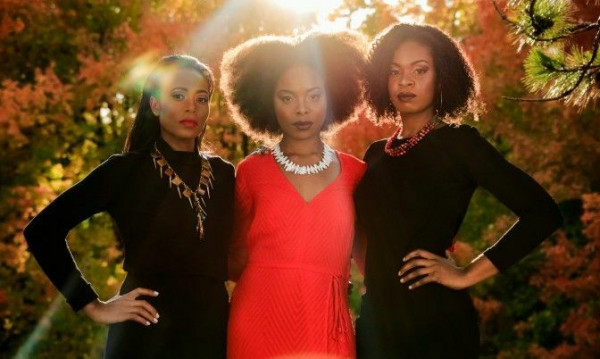I was surrounded by white girls whose silky hair blew effortlessly in the wind. I longed to look like them. Meanwhile, my hair was thick, coarse, and proudly defied gravity. Still, even though I looked different, my peers were kind. They were genuinely fascinated by the intricate hairstyles my mother created. Every month, she would sit me down and thread my hair using a traditional Ghanaian method known in our language as Ahoma— “hair threading” in English. She would grease my scalp to keep it from drying out, gently stretching and wrapping my strands into beautifully sculpted styles.
I remember the excitement I felt going to school the next day with a new look—how special it felt to be admired, even if I didn’t look like everyone else. Ahoma made my hair thick, kept it moisturized, protected my ends, and overall, gave me a full, healthy head of hair. Back then, I didn’t realize that those moments were sacred. They were part of a lineage of beauty practices passed down through generations—acts of care, of culture, and of resistance.
But now, we’re also passing down something else with our hair care rituals - harmful chemicals.
A comprehensive analysis by the Environmental Working Group (EWG) revealed that nearly 80% of over 4,000 beauty products marketed to Black women contain at least one moderately hazardous ingredient. These products include hair relaxers, skin lighteners, and synthetic braiding hair. Consumer Reports found carcinogens in 10 out 10 of the most popular synthetic hair braiding products marketed to Black women.
These products are staples in many beauty routines, but at Ofori, the organization I founded, we work to change that through education, wellness, and community.
{https://www.instagram.com/environmentalworkinggroup/reel/DF7_-e3JHq6/}
Hair relaxers, designed to straighten curly hair, have been linked to serious health concerns. These products often contain endocrine-disrupting chemicals such as phthalates, parabens, and formaldehyde. Research indicates that exposure to these chemicals is associated with reproductive health issues, including uterine fibroids and an increased risk of breast and uterine cancers. Despite these risks, hair relaxers remain largely unregulated, leaving consumers vulnerable to their harmful effects.
The use of skin-lightening products is another area of concern. These products often contain hazardous substances like corticosteroids and mercury, which can lead to metabolic problems, kidney damage, and nervous system disorders. The pursuit of lighter skin, driven by societal pressures and colourism, has led many Black women to use these dangerous products, often without full awareness of the potential health risks.
Braiding is a cherished cultural practice among Black women, symbolizing heritage and identity. However, recent investigations have uncovered that synthetic braiding hair used in these styles may contain harmful chemicals, including carcinogens and volatile organic compounds (VOCs). A study by Consumer Reports found that popular synthetic hair brands contained dangerous substances, posing potential health risks to users. Prolonged or repeated exposure to these chemicals can lead to scalp irritation, respiratory issues, and even cancer.
The prevalence of these harmful products is deeply intertwined with societal beauty standards that favour Eurocentric features. Racialized beauty norms pressure Black women to alter their natural appearance to conform to Eurocentric ideals of beauty—straight hair, lighter skin, and more “tame” textures. I didn’t fully understand the weight of these norms until I moved as a teenager from London, Ontario to Brampton, Ontario. Suddenly, I was surrounded by more Black girls—something I had longed for—but I was also introduced to a completely different understanding of what it meant to be beautiful as a Black girl.
When I moved to Brampton, I thought being surrounded by more Black girls would mean feeling more seen. But instead, I encountered a painful truth: even within our own communities, certain beauty standards were upheld over others. My stepmom teased me for wearing my natural hair. The Ahoma styles that once made me proud were now dismissed as something only “village girls” wore. I was told that modern girls had relaxed hair or wore long, flowing extensions. This message was completely new to me, but I internalized it quickly. I wanted to fit in so badly. I wanted my hair to fall to my shoulders like everybody else’s instead of standing tall and reaching toward the sky.
In Grade 9, I wore my first set of single braids with extensions. They were beautiful—I truly loved how they looked. But when I took them out, I was devastated. My hair came out with them. I had lost a significant amount of length. And still, I kept going back to braids, believing what I was told—that they were protective styles, even though I could clearly see the opposite was happening to my own hair. In June of that same school year, I got my first relaxer. I’ll never forget the strong smell of the chemicals being mixed, and the burning sensation on my scalp after it was applied. I was told the heat meant the relaxer was “working,” so I sat through it. After rinsing it out, my scalp felt raw and tender, and I was warned not to wash my hair for at least a week. I developed scabs from the burns. But none of that stopped me. Because I had already absorbed the message: beauty is pain, and this was the price I had to pay to belong. But at what cost?
In response to this pressing issue, I have dedicated myself to empowering Black women through education. At Ofori, we specialize in delivering workshops that provide Black women with the knowledge and tools to make informed decisions about beauty practices, self-confidence, and overall wellness. Our mission is to raise awareness about the long-term health implications of using products like hair relaxers, skin lighteners, and synthetic braiding hair.
At Ofori, our workshops help Black women begin to reconnect with themselves through education and community. Participants learn to identify harmful chemicals and explore safer alternatives, celebrating natural beauty.
One of the first things we teach is how to read product labels critically. A good rule of thumb: if you can’t pronounce the first five ingredients, it’s worth researching before applying it to your body. Be especially cautious of ingredients like parabens, phthalates, formaldehyde-releasing preservatives, and fragrance (often a cover for a cocktail of undisclosed chemicals). These are commonly found in products marketed to Black women, especially in relaxers, braiding hair, and skin lighteners, and have been linked to hormone disruption, scalp damage, and even increased cancer risk. We also help participants understand certifications, clean beauty standards, and how to transition to products that nourish rather than harm their bodies.
EWG provides an easy-to-use guide where you can type in the name of any product you use to find out if it contains harmful ingredients. But this isn’t just about switching brands—it’s about reclaiming agency over our bodies, our health, and our beauty.
Our workshops emphasize the importance of holistic wellness, encouraging practices that nurture both the body and mind. We promote self-acceptance and the celebration of natural features, fostering a positive self-image among Black women.
We create safe spaces for open discussions about beauty standards, cultural pressures, and personal experiences. These conversations are essential in reshaping narratives and building a supportive community that values authenticity and health over conformity.
Through our workshops, we have witnessed transformative changes in participants. Women who once felt compelled to use harmful beauty products have begun embracing their natural hair and skin, not just because it’s healthier, but because they now understand the power of doing so. After one of our summits, a woman reached out to me personally. She shared that the information she learned during our sessions had completely changed her life.
For years, she had relied on extensions and relaxers. Eventually, she stopped using extensions because the tension on her scalp became unbearable, but she continued relaxing her hair, not realizing the damage it was causing. After attending the summit and being exposed to the science, history, and emotional truths surrounding our beauty practices, she decided to go fully natural. She told me she was finally committed to learning her hair, loving it, and giving it what it actually needs, not what society says it should look like. Loving yourself—and your hair—is a vital and sensitive part of this journey. And knowing that I was able to create a space where that transformation could begin fills me with joy and purpose. By providing education and support, we don’t just help individuals—we challenge harmful beauty standards and advocate for systemic change in the beauty industry.
The issue of toxic beauty products is not just a personal concern; it's a collective responsibility. We must advocate for stricter ingredient transparency laws, mandatory safety testing, and better regulation of beauty products marketed to women of colour. Consumers should be empowered with knowledge, and manufacturers should be held accountable for the safety of their products.
Black women deserve beauty practices that honour, not harm, them. Join us at Ofori, attend a workshop, start the conversation, and choose products with care. Together, we can demand a safer, more inclusive beauty industry that sees, protects, and celebrates us.
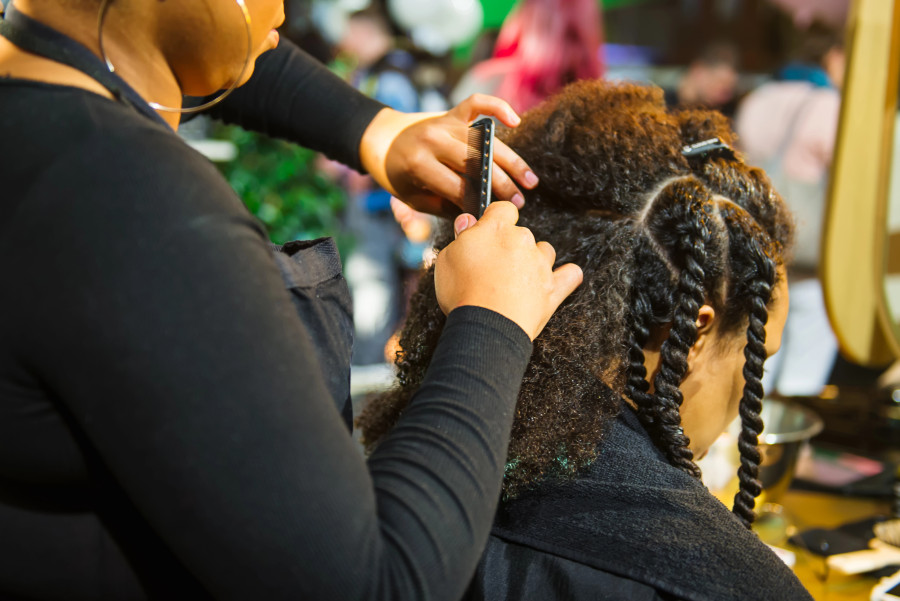
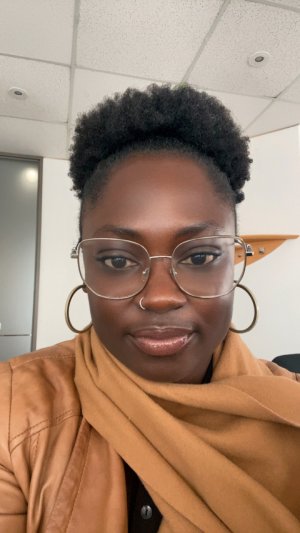 By
By 




